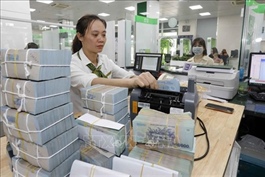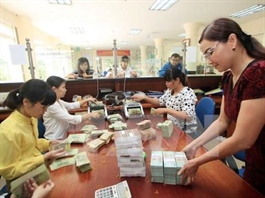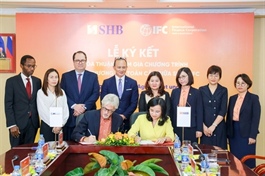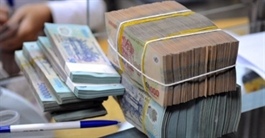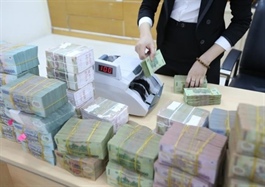Cashless society ambitions offered a helping hand
Cashless society ambitions offered a helping hand
Vietnam is swiftly revolutionising its financial sector by phasing out outdated card technologies, embracing non-cash solutions, and enacting laws to enhance security.

Pham Anh Tuan, head of the Payment Department at the State Bank of Vietnam, asserted that the nation’s legal frameworks are well-poised to bolster non-cash transactions and facilitate the growth of the card market.
“The legal framework to encourage non-cash payments and enhance card usage is remarkably robust,” Tuan stated at last week’s conference on future payment trends, underscoring the nation’s committed approach to modernising its financial landscape.
Accordingly, the Vietnam’s card market has witnessed swift and substantial growth in recent years, marking a significant stride towards diminishing cash transactions. By July, the total number of cards in circulation exceeded 140 million, reflecting an 8.27 per cent augmentation since the close of 2021. Of these, nearly 10.8 million were procured via electronic know-your-customer, a method now employed by 27 banks in the country.
Vietnam’s conducive environment and the flourishing digital ecosystem ensure seamless integrations between banks and various service-providing entities, creating a fluid, user-friendly experience for consumers. “A single application can cater to a diverse array of payment needs, from cinema tickets to dining out,” Tuan said, highlighting the evolving consumer experience in the digital age.
Despite these advances, experts believe the realm of domestic credit cards still harbours substantial untapped potential.
Nguyen Quoc Hung, secretary-general of the Vietnam Banking Association, said, “Several academic institutions are collaborating with banks for tuition fee payments through domestic cards. This innovation, albeit novel, still lacks the convenience offered by the likes of Visa and Mastercard. Substantial enhancements are imperative.”
Meanwhile, economist Can Van Luc believed that Vietnam’s journey towards a cashless society is reportedly outpacing its regional peers, with the frequency of transactions escalating by approximately 70 per cent and the transaction value by 35 per cent over the last three years.
“However, the country is still grappling with high cash usage, constituting 47 per cent of personal transactions as of 2022, parallel to Indonesia,” Luc said. “It implies there is ample scope to reduce cash transactions to levels seen in Malaysia and India, which stand at around 30 per cent.”
This year, significant legislation including the laws on land, real estate business, and housing has been passed, all of which Luc and his team have advised to include non-cash payment options in transactions once they are enacted. “From a policy perspective, I urge the government to provide a more updated, comprehensive legal corridor to foster card market development,” he said.
Concerns surrounding data integrity continue to loom over individuals, corporates, and banks. With the presence of a national database system, Luc emphasised the necessity of continued refinements and integrations in the system to ensure security, convenience, and low costs. “In the long run, integration is inevitable, but it must be synchronised. Research on cards related to digital payment trends, including future digital currency, is crucial,” he added.
According to Nguyen Quang Minh, CEO of the National Payment Corporation of Vietnam (NAPAS), Vietnam currently boasts over 140 million active cards, including 103 million domestic and 36.7 million international ones, with more than 40 banks and four financial institutions engaged in card issuance.
“The ongoing transition from magnetic stripe to chip cards as an inevitable stride towards enhanced security in the sector,” Minh said.
He further unveiled NAPAS’ ventures in advanced payment technologies aimed at elevating user experiences, and is set to launch a Tap to Pay service within the year.
Le Phuong Hai, deputy general manager of Vietcredit, also outlined their concentration on domestic credit cards, especially targeting segments like students and individuals with unstable incomes. “Introducing students early to credit concepts fosters prudent financial habits and adept financial management in their future,” he expressed.



